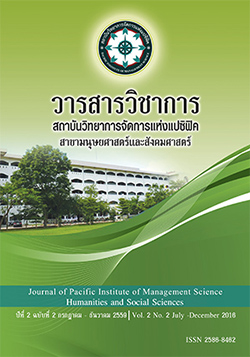AII Iiving is Meeting: A Buberian Approach To Environmental Ethics
Abstract
When we look around Thailand, we can see how our environment is deteriorating day by day due to human carelessness and his greed for wealth and comforts. As a teacher of ethics, I would like to bring out in this short research paper the ethical values involved in caring for environment. There is a growing awareness that world peace is threatened not only by the arms race or regional conflicts or continued injustices among peoples and nations, but also by a lack of due respect for nature. Humankind’s failure to relate to nature, failure to relate to its ecosystem with respect, is clearly reflected in the ongoing environmental crisis, which our newspapers daily speak of. The environmental crisis has been on the increase When I speak of environmental crisis has been on the increase. When I speak of environmental problems I refer to those problems that arise from human dealings with the natural world and its ecosystem. Human beings cannot help using and modifying the natural world, since we depend on nature for our food, clothing and shelter, for the water we drink and the air we breathe and so on, The unintended, often careless human actions are now creating problems like global warming, the extinction of multitudes of species of flora and fauna, the pollution of water sources are problems that raise profound issues regarding how we should live our lives and organize our societies, that were never encountered by previous generations (Attifield, 2003, p.1) As we look into our society’s future, we you and I – must avoid living only for today attitude by plundering the nature for our own convenience alone without thinking of tomorrow. We cannot risk our heath or that of our grandchildren by the destruction of our planet’s resources. Martin Buber, the Jewish philosopher and theologian, has advanced the philosophy of relationship in his book “I and Thou” (1929). In this paper I like to develop an environmental ethics based on his philosophy of dialogical relationship between man and nature. At present I am teaching ethics and I would like to know more about the ethics of environment, and how should we take care of it. I would like to use Martin Buber’s thought of I-Thou relationship in finding a solution to the problem of environment. In my opinion a complete environment ethic can be constructed using the philosophy of Buber.
References
Buber Martin (1961). Between Man and Man,Ronald Gregor Smith(tr.). Boston: Beacon Press.
_________.(1957).Eclipse of God, Maurice Friedman et al.(tr.) New York: Harper Torchbooks.
_________.(1953). Good and Evil, Ronald Gregor Smith(tr.) New York: Scribner.
_________.(1958). Hasidism and Modern Man, Maurice Friedman(tr.&ed.). New York: Harper Torchbooks.
_________.(1985). I and Thou, Ronald Gregor Smith. (tr.)(2nd ed.) New York: Scribner.
_________.(1963).I srael and the World, Maurice Friedman et as. (tr.) New York: Shocken Books.
_________.(1960). The Knowledge of Man, Maurice Friedman(tr.) New York: Harper Torchbooks.
_________.(1958). Moses the Revalation and the Coenant, New York: Harper Torchbooks.
_________.(1960). The Origin and Meaning of Hasidism, Maurice Friedman(tr.) New York: Harper Torchbooks.
_________.(1960). Paths in Utopia(PU),R.F.CHULL(tr.).Boston: Beacon Press.
_________.(1963). Pointing the Way, Maurice Friedman(tr.) New York: Harper Torchbooks.
_________.(1961). Two types of faith, Norman Goldhawk (tr.) New York: Harper Torchbooks.
B. Secondary Sources
Collin,Peter (1998). Buber Buscaglia on Philosophy and the Teacher-Student Relationship, Vol.1 No.2
Cahen,Harely (1988). Against the Moral Considerability of Ecosystems in Environmental Ethics, Vol.10.Fall. Carson,Rachel (1962). Silent Spring,Houton Mifflin.
Chou L.M.,Goh B.L.,and Lam,T.J(1998). Environmental Protection and Biodiverssity: Conservation in Singapore.London: AEAN Academic Press.
Daniel Botkin (1940). Discordant Harmonies. New York: Oxford University Press.
Davies,Stuart J (1998).Tropical Ecosystem: Environmental Impacts,in Biodiversity Conservation in ASEAN.London: AEAN Academic Press.
Devall,Bill,Sessions & George.(1993). Deep Ecology. Radical Environmentalism. California: Wadsworth Publising Company.
Donald L.Berry(1985). The Vision of Martin Buber. New York: State University.
Flavin,Chistopher(1997). The legacy of Rio, in State of the World. New York: W.W.Norton and Company Friedman Maurice & Paul (ed.)(1967). The philosophy of Martin Buber.New York:Open Court.
Hobart. (1990). Board of Environmental Studies. Australia: University of Tasmania,
________.(1977).The Age of the world Picture: The Question Concerning Technology and Other. New York: Harper & Row.
________ .(1977). The Question Concerning Technology and Other. New York: Harper & Row. Joseph R. Des Jardins (2001). Environmental Ethics Canada: Wadsworth Group.
Katz, steven.(1984). A Critical Review of Martin Bubers Epistemology of I-Thou: in A Century Volume Haim.Gordon and Jochanan Bloch(ed.) New York: Ktav Publishing House.
Light,Andrew R.F.(1992) The Role of Technology in Environmental Questions: Martin Buber and Deep Ecology as Answers to Technological Consciousness’in Research in Philosophy and Technology,Vol.12.
Robin Atifield (2003). EnvironmentalEthics. Cambridge: Blackwell Press.
Water Kaufman (1999).A New Translation with a Prologue and Notes. New York: Touchstone.
Downloads
Published
Issue
Section
License
บทความที่ได้รับการตีพิมพ์เป็นลิขสิทธิ์ของ สถาบันวิทยาการจัดการแห่งแปซิฟิค
ข้อความที่ปรากฏในบทความแต่ละเรื่องในวารสารวิชาการเล่มนี้เป็นความคิดเห็นส่วนตัวของผู้เขียนแต่ละท่านไม่เกี่ยวข้องกับสถาบันวิทยาการจัดการแห่งแปซิฟิค และคณาจารย์ท่านอื่นๆในสถาบันฯ แต่อย่างใด ความรับผิดชอบองค์ประกอบทั้งหมดของบทความแต่ละเรื่องเป็นของผู้เขียนแต่ละท่าน หากมีความผิดพลาดใดๆ ผู้เขียนแต่ละท่านจะรับผิดชอบบทความของตนเองแต่ผู้เดียว







